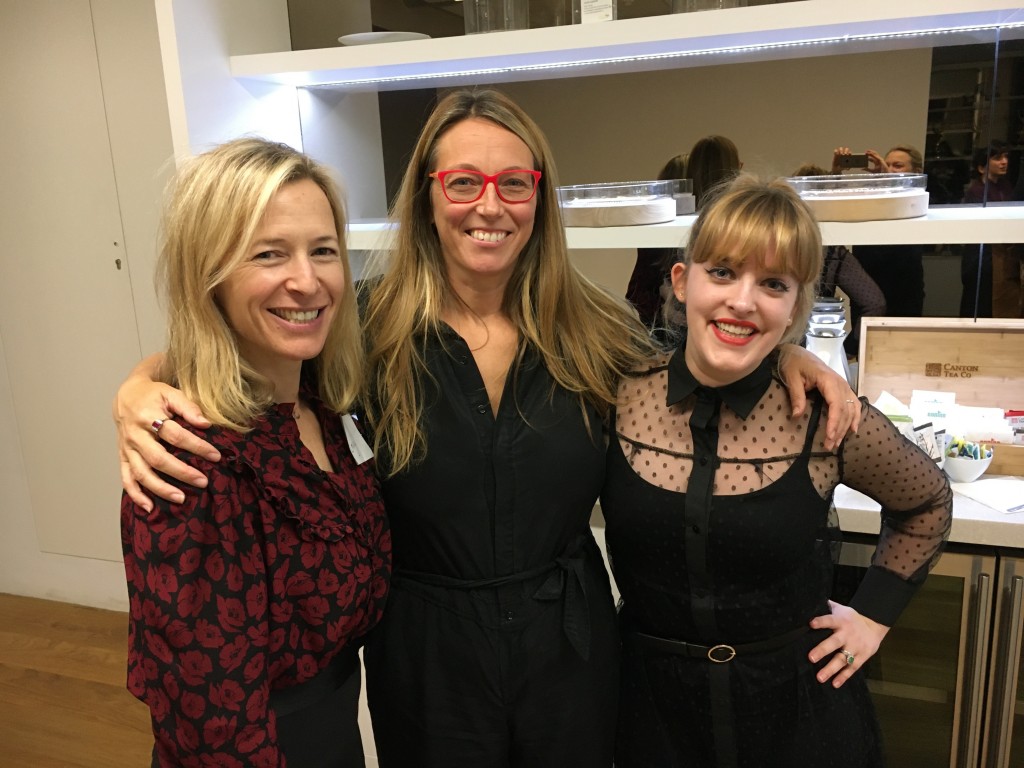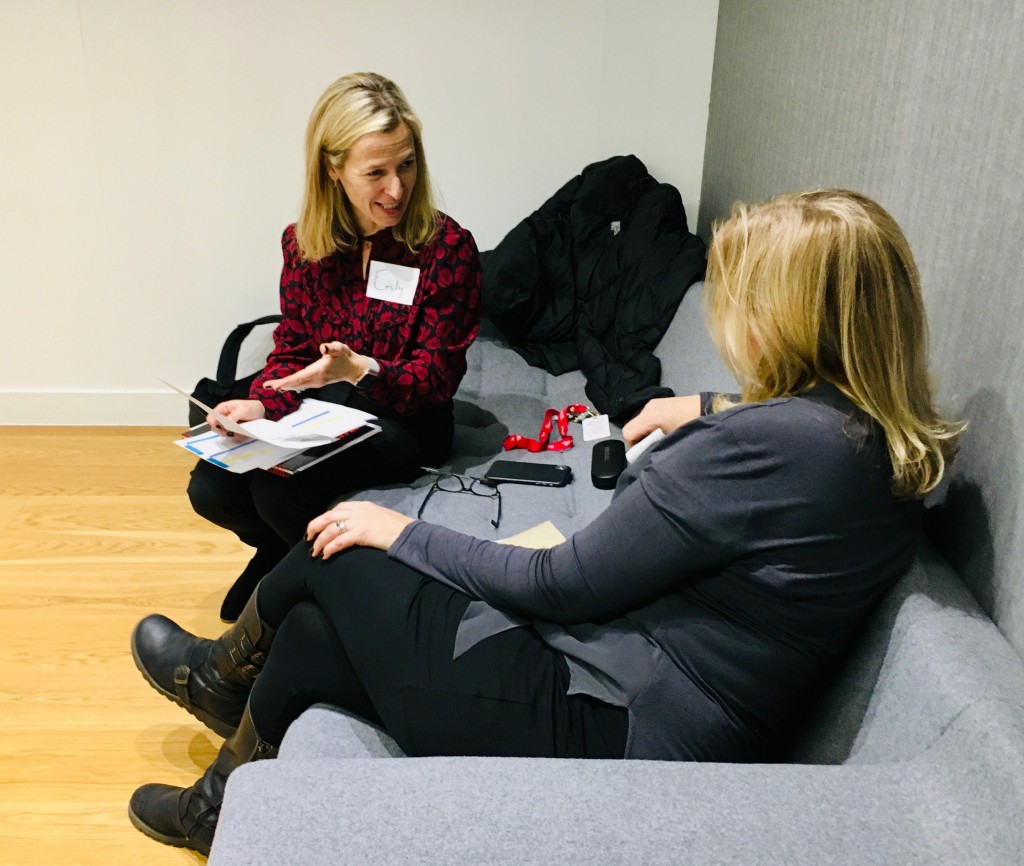In order to maximise your opportunity in an online interview, make everything as easy as possible for a potentially tired, zoomed out, busy employer, writes Zoe Russell-Stretten, Head of Talent at Brinkworth. Ahead of Media Parents’ How to Ace a Job Interview Online workshop this Friday, Zoe has kindly shared some tips on online interviews.
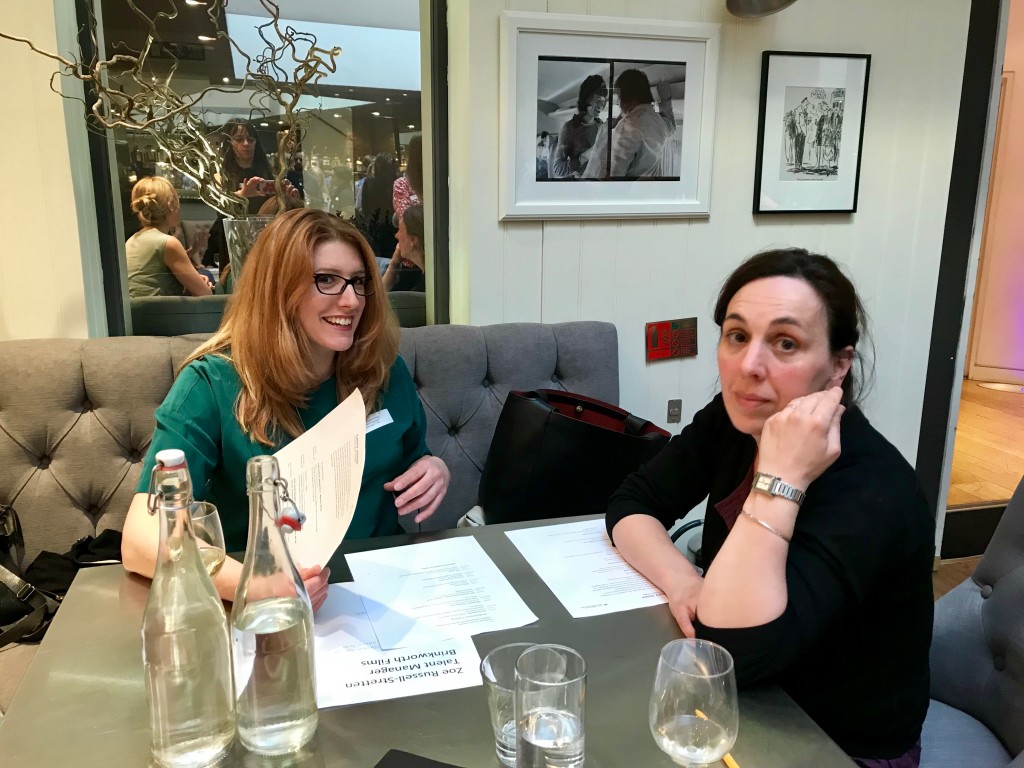
Zoe Russell-Stretten from Brinkworth (left) at Media Parents CV Event in the days when we could all go out
We always interview people in pairs at Brinkworth, or even sometimes in threes. An interview with an AP or more junior will last approximately half an hour. Anyone more senior is typically an hour.
Tech:
Almost everyone uses either Zoom or Teams. If you don’t have a basic working knowledge of both, practise using the features before the interview. Always download the application prior to the interview, so you don’t waste the first ten minutes of precious time. It will work!
Maximise your broadband. There’s nothing more frustrating than a poor quality picture, one that is lagging, out of sync or other symptom of poor broadband. This is your first impression, and the interviewer should be able to both see and hear you in real time. Some people do genuinely suffer from poor broadband speeds, but often, this can be improved. Turn off the wifi on all of your other devices in the house; your mobile, other laptops, possibly your TV, an Alexa or Google hub. Beg or bribe other householders to withhold from using the internet for that one sacred hour. If an employer has to work extra hard to connect with you, it’s hard to make a good impression. Test this with a friend beforehand.
Audio. Again, do a test beforehand. Turn off radios. Shut windows. Explain to children, partners or housemates that there’s a lot of chocolate in this for them if they don’t make a noise for an hour. If your audio is unreliable, learn how to use the mute function. Mute yourself when you’re not speaking, to avoid the speaker getting feedback. To avoid most problems, it’s usually easier to use headphones.
Presentation:
Because we’re all at home now, you are technically inviting a prospective employer into your home. So take a look at what the employer can see. Laundry? Clutter all over the carpet? Questionable art on the wall? Something on the shelf (eg that BBC interview)? A lot of people have their home workstation set up in their bedroom. If all else fails, use a filter on your background but make it a professional looking one.
Even if your CV is brilliant, if your house presents as a mess, employers might be worried about entrusting a complex project to someone who can’t present a sense of order and calm. Unfortunately, first impressions really do count, and your home/environment says so much about you.
Also – unless absolutely necessary, avoid taking the call on your mobile. Wherever possible, use a static device. An hour of watching someone’s own shaky hand-cam is extremely draining (especially when you’re doing it hour after hour).
Lighting! We work in a visual industry. If you are anything above a researcher, you should be able to demonstrate that your mind considers things in a visual way. So make sure you’re not backlit, that your face can be seen clearly, and that again, the interviewer isn’t having to mentally work hard to piece together information about you because you’ve set up your interview poorly. It’s amazing the number of shooting PDs who interview for a job but fail to think about setting up the shot of their own face!
Framing. Test with a friend how your framing works. Set your monitor or laptop up so that it’s level with your face. So many people look down into their computer – and it gives the interviewer an excellent view up your nose. Also, learn how far back you should be to your screen – another frustration is people who sit too close and you are left interviewing their forehead, or just the top half of their face. It’s just extra mental work for the interviewer, and in the TV industry, isn’t really a great first impression. Everyone should be able to frame a basic shot.
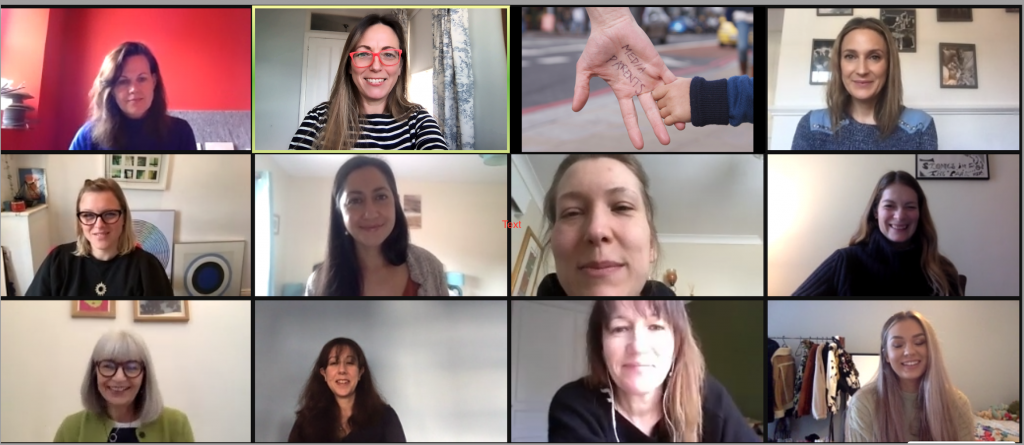
Our next event, How to Ace a Job Interview Online, is on Friday 3rd March, email via the contact button above for details
Personal Presentation:
Just because this is an interview taking place in your home, it doesn’t mean that you should dress like you’re at home. Think about how you personally present, and apply the same rules that you would if you were meeting in an office. Dress the part, secure your hair off your face, don’t wear dodgy slogan clothing or something that a child or pet has just been sick upon.
A note about make up – depending upon your camera – some more modern cameras allow a lot of detail. So it can mean a little less is more. One of the strange things about online interviews is you can literally see yourself and how you come across, and if you have any insecurities about your appearance, this can be really distracting. You want to be able to stay confident and focused on what you’re saying. Both Zoom and Teams have filters that allow you to optimise your image (not cat filters, just gentle improvements). If you’re feeling a bit less confident in your appearance (as so many of us do right now!), then these filters are well worth knowing about as they can give just a little boost of self-confidence and stop people from focusing too much on their own face.
Prep:
Now that we are all stuck at home, but with tools to access all of the information on the planet literally sitting in our pockets, there’s just no excuse for not preparing for an interview. Watch. The. Employer’s. Output. This isn’t the early naughties – everything is available on demand, and if it’s not, it will be somewhere on YouTube or Vimeo or similar. Familiarise yourself with the style of programmes. It will empower you so much more in an interview, and there may be opportunities to demonstrate that you’re so invested in getting the job, that you’ve taken time out of your day to do this kind of research. It really really impresses. Every time.
Also – come prepared with questions. Thoughtful, editorially focused questions. Try to make sure they don’t sound critical of the employer or previous output. Practical, logistical and rate-related questions relating to the job itself can be dealt with post interview with either the TM or PM, so don’t waste this opportunity by asking ‘how much will I get paid’ at this juncture. Ask about editorial steer, tone, use of music, access, casting, overall production schedule etc… anything that shows that you’re thinking the way you would if you were already in the job. This is just another way to show that you care about getting the job.
Etiquette:
There may be some people on the call that don’t do much speaking. The people that don’t speak are doing a lot of thinking… and almost definitely they are there because their opinions about you impact on your ability to get the job. So don’t forget to acknowledge them or include them in your greeting, farewell, and of course – if the opportunity arises to reference something they may have said or be involved in. If you’re really at a loss, just use your eyeline to make sure you’re looking at everyone at different stages in the call. Most often, they can see that you’re doing this and that you’re being inclusive. Regardless of your level of seniority, this portrays you as a respectful team member, and everyone wants that!
Back in the good old days of offices, this same rule applied. People who failed to acknowledge others in the meeting performed poorly, and were less likely to get the job as it was an indication as to how they perceived a) their own status and b) how they would behave on a team.
Some Positives:
Online interviews, and homeworking, are brilliant for opening up more opportunities to work. As a Talent Exec, I can now hire people based purely on their skills, without having to take their geographical locations into consideration. I can hire people who are juggling childcare, or other caring responsibilities – where previously more exceptions would have needed to have been made, these issues are no longer something to be ‘solved’ or agreed upon. People can work far more flexibly.
The same goes for access in general – for those with other access to work challenges. The removal of a commute to an office instantly broadens the talent pool in a positive and exciting way. We have always tried to make jobs as accessible as possible, but we are able to do so with far more ease and success now.
And finally…
Just a general note for interviews in any situation. Please don’t tell me that you’re great. Just be great. The individuals that are at great pains to describe themselves using the adjectives on their personal statements on their CV come across as insincere – and I sometimes suspect they are doing it out of nervousness. Try not to let nerves get in the way, but if they’re there, it’s much more acceptable to acknowledge those by saying ‘ah… it doesn’t matter how many years I’ve been in this job, I still get nervous in interviews!’. That shows you care. Going hard the other way to cover up your fears is off putting and makes it very hard for the interviewer to see through the self-advertising which can come over as egotistical.

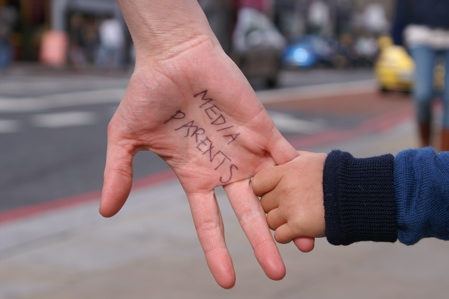
Join us for Media Parents events, jobs and training at www.mediaparents.co.uk. Our latest event is on Friday 5th March
